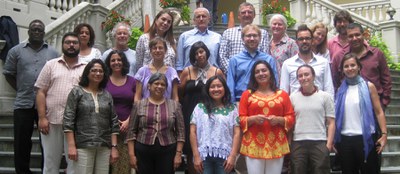FCMC continues collaboration on Natural Resource Governance Framework

To address this sticky problem, the NRGF is intended to develop a robust, credible process for assessing the strengths and weaknesses of natural resource governance, and supporting improved decision-making and accountabilities in the planning and implementation of policies, programs and projects that affect natural resources.
Dr. James Murombedzi, of the Council for Development of Social Science Research in Africa (CODESRIA) and CEESP, gave the plenary presentation focusing on how good governance depends on the roles balanced between the state, civil society, and the market. FCMC's Dr. Janis Alcorn introduced the session on "What is a Framework" – to kick off discussion of the values and principles that form the foundation for the NRGF. Dr. Mike Jones of the Stockholm Resilience Center led an evening seminar on Resilience in the Context of Climate Change, and challenged participants to use resilience theory to shape the NRGF. Joji Carino, Executive Director of the Forest Peoples Program, detailed lessons for building NRGF based on her experiences with the World Dams Commision Framework which lays out a process for rights holders and risk holders to assess and reach decisions about a proposed development activity. Mayra Tenjo of the Latin American Institute for an Alternative Society and Law (ILSA) led a spirited discussion on the importance of intercultural communication and mutual respect for achieving governance improvements. There was general agreement that the NRGF must be developed in close collaboration from partners in geographic regions in order to be adapted to the different cultural and governance contexts.
From WCEL, participants included legal experts from the Organization of American States, American University Law School, Environmental Law Institute, and Center for International Environmental Law. WCEL participants are leading the Task Force on Values and Principles for the NRGF. A follow up NRGF meeting was hosted by IUCN's Environmental Law Centre in Bonn on August 12 and 13.
For more information about NRGF, please click here.

